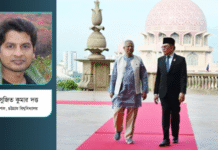Egyptians need to provide an answer on what kind of change they want.
Awaiting history’s judgment of Defence Minister Abdel Fattah El Sisi, his call for street demonstrations to support his fight against “violence and terror”, is outrageous, though not terribly surprising.
Faced with mounting outcry from the Brotherhood’s rank and file against the ousting of President Morsi, the general has continued to escalate his ultimatums and the use of force to quell cries for the return of the elected president.
Indeed, one wonders how Sisi, who’s a deputy prime minister, makes such a bombastic declaration that calls for major escalation as if there is no prime minister or a president!
As the man in charge of Egypt’s safety and stability, tasked with containing violence in the public sphere, Sisi seemed all too eager to amplify tensions and confrontations to protect his turf.
To street or not to be
Soon after the coup and arrest of a number of their leaders, the Muslim Brotherhood concluded that the only way to protect themselves against further repression would be to retrench in the nation’s streets and public squares.
Down but not out, the Brotherhood leadership called on their supporters to set up camp during the hottest month of the year, which also happens to be Ramadan, leaving them without food or drinking water throughout the day. They have remained steadfast in the hope of forcing the military to backtrack on its decision.
The military, in response, called upon the anti-Brotherhood camp to openly and publically display their resolve.
So both the military and Brotherhood continued to score points in a heated competition, including over size, duration, passion, and exact number of demonstrators who heeded their call and turned out on the streets.
As if bringing millions more to gather would resolve anything, such incitement and the consequent building of tension in fact further destabilises the country.
Indeed, watching mayhem and death in the streets makes clear just how counterproductive and dangerous it is to escalate strains between opposing forces. Rather than bring the country closer to a solution, whipping up and pronouncing tension only brings Egypt a step closer to chaos.
Three interconnected challenges
If one listens carefully to what the street is collectively saying, it’s quite simple to make out the message: the overall majority of Egyptians do not want to be ruled by one party, one ideology, or one force.
They still wish for what they wanted back on January 25, 2011: “Bread, freedom, and social justice”, deliverables that his detractors believe Morsi failed to accomplish, or as his supporters contend, didn’t have the time to realise.
But Egypt’s foremost challenges – security, economy, and good governance – cannot be resolved on the streets; nor can they be resolved in the shadow of a conflict between the Muslim Brotherhood and the military, from which Egypt and other Arab countries have suffered for decades.
Instead, Egypt needs to restore stability and security by starting with a de-escalation of the mass demonstrations, which importantly, must not be accomplished by force. Today’s unravelling violence might seem to provide for a short term solution, yet, entangling, intractable problems will arise.
If the Brotherhood failed on a number of important fronts and President Morsi showed little leadership on economic and social issues, General Sisi is acting quite irresponsibly. Besides, the military’s record on good governance and the economy is dismal to say the least.
In fact, none among Egypt’s leaders, generals, and religious symbols to this day have proven capable of lifting the country out of deadlock. Those capable of leading have no answers, and those with answers are not leading. Indeed, the louder and the more self-righteous they are, the less constructive the leaders seem to be.
Be that as it may, now that the streets have spoken again, it is the institutions, political parties, and the greater civil society, including this new generation of youth, which need to act responsibly. This begins by depersonalising the hostilities and restraining the ambition of overtly ambitious men.
Not who, what
Just when the Brotherhood had concluded that their fight shouldn’t be about Morsi per se, but rather about defending “the legitimacy of the ballot box”, Sisi made it more about himself and his personal campaign against the Muslim Brotherhood.
Having his face plastered on posters, while protesters demand an end to the era of a singular ruler, only goes to confirm worries over the return of the military men to politics.
But after people revealed their disapproval and outright hostility toward Mubarak’s one man, one party rule, and later to Morsi’s attempt at the same system of rule, Sisi’s attempts at one man, one military rule is far-fetched.
If the Muslim Brotherhood is inward-looking, the military is even more insular when openness to others is indispensable to governing the country.
In retrospect, it was clear since Mubarak was on his way out in January 2011 that the big question facing Egyptians was not who replaces President Mubarak, but rather what replaces the Mubarak regime and how to accomplish the transition.
Yet, the rush to hold presidential elections while Mubarak’s regime remained intact went on to split the nation and complicate the challenges facing Egypt.
In an increasingly polarised and hostile political atmosphere, any one leader is sure to become a divisive factor. And when the choice, as it’s likely to be, is between an Islamist and a secular candidate, any winner will end up alienating the voters and supporters of the other side at a time when inclusion, not alienation, is most urgently needed.
Put simply, gone are the days of one leader representing one party or of one side prevailing in Egypt. And that requires a major change in the system of governance.
As they ponder a new pluralistic constitution that befits this great land, Egyptians might want to consider replacing the Presidential System that produced pseudo modern pharaohs, with a system that would more likely produce broad coalition governments.
The quiet deterioration of the economy
Lost in the street noise is the silent deterioration of the economy. As Egyptians take their time to resolve their issues, they could be faced with a totally bankrupt country that is incapable of resolving any of its basic problems.
The earlier that Egyptians sober up from their disillusionment with the politics of power, and get down to the business of running their country, the more likely it will be for them to save it from total collapse.
The $13bn pumped into the economy from Saudi Arabia and the United Arab Emirates to help the military maintain its control are quite substantial; but, such funds can only go so far in beginning to heal the structural challenges facing the economy.
It’s true that “man cannot live by bread alone”; yet, nor can he survive without it. And it so happens that in the Egyptian dialect, bread and life share the same word, a’ish.
Indeed, those who are likely to suffer most in the future are the urban poor who are less likely to afford feeding their families. Egypt’s total debt is already 87 percent of GDP and 74 percent of that is domestic. As instability and insecurity deepen, the debt is skyrocketing on top of 12 percent interest rates.
Since three quarters of the debt is owed to local banks, any default on payment is bound to affect the entire economy. In 2012-2013, Egypt paid a quarter of all the government’s budget expenditures – or 147 out of 615 billion Egyptian Pounds (EGP) ($21bn USD) to service its debt.
That sum nearly equals the total of all government expenditures put toward public sector wages, or 149 billion EGP ($21.28bn), which by itself is also quite inflated by nepotism that creates unproductive jobs.
Add to all this, the Egyptian government’s subsidies for fuel and food has already reached a high 167 billion EGP ($24bn), or more than a quarter of the total government budget.
Therefore, interest payments, wages, and subsidies represent 75 percent of the budget’s total expenditures, leaving any future government with less than a quarter of its budget to be put toward all other important business of the state.
Moreover, if we factor in lower wages, lower productivity and lower taxes caused by instability, the next government is more likely to be bankrupt and/or incapable of fixing the deteriorating infrastructure of the country, not to speak of its schools, hospitals and social services.
Last year, public investment was as low as 47bn EGP ($6.7bn), or less than 3 percent of the economy of 1715bn EGP ($245bn).
This is no way to rebuild a country after a revolution.
Comprehensive solutions
In summary, Egypt has much on its plate and no one party, let alone one leader or a general, will be able even to begin tackling the country’s urgent challenges.
Even a widely supported broad-coalition government will find it challenging to govern in the near and intermediate run, considering the need to affect painful structural transformations all the while attaining the promised social justice.
The three challenges delineated above are entirely interdependent and cannot be tackled separately. Good and collective governance is central to improving security and the economy, just as improving security is indispensable to saving the economy.
Nations cannot live on slogans, and revolutions do not succeed without deep social and economic transformations.
Egyptians deserve representatives that are able to make the relevant points to improve life, not score points that lead to death and destruction.
Marwan Bishara is the senior political analyst at Al Jazeera.
The views expressed in this article are the author’s own and do not necessarily reflect Al Jazeera’s editorial policy.
Source: Aljazeera










